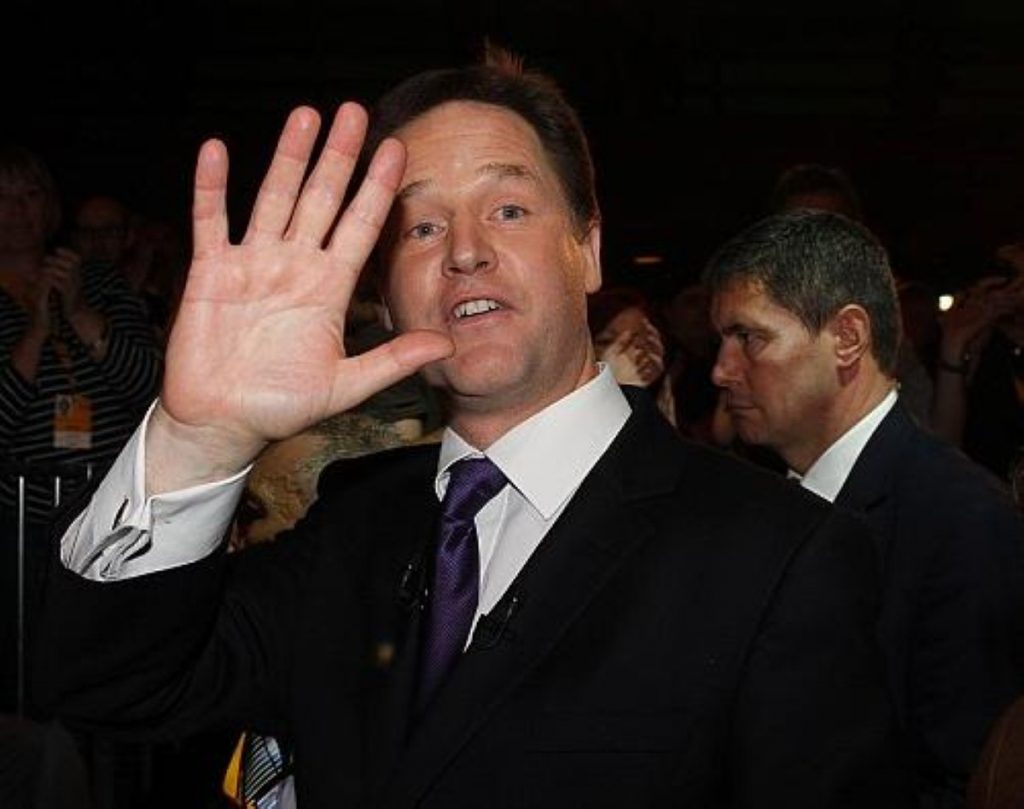The night the Lib Dems gave up their last remaining principles
Generally speaking, the Liberal Democrats get a hard time of things. Journalists and the public like to view politics as a black and white battle of convictions, when in truth it is necessarily a process of compromise between individuals and interests. Shrieking betrayal at the smallest concession isn't just childish, it's also undemocratic. Compromise is the mechanism we use to muddle through in a free society.
Much of what has been written about the Lib Dems over recent years has been unfair. None of Nick Clegg's armchair critics would have been able to make a better decision after the election in 2010. Of all the difficult options available to him, he made the least damaging one. In power, the Lib Dems have fought off plenty of really grotesque Tory policies and modified others. You can’t win an election on negative counterfactuals – no-one votes for what might have been if you hadn’t been around. But they had these battles nonetheless, to little public recognition. Plenty of Lib Dem critics enjoy a better life now than they would have had if the party wasn't in power.
The party also has some of the most intellectually and morally impressive advisers in Westminster. The people operating behind the scenes are typically free thinkers and unencumbered by the shackles of ideology and tribalism which so besets Labour and Conservative MPs. Those around Clegg are, in my experience, particularly impressive.
But last night the party sold out whatever remaining principles it had after four years in office. There can be no excuse for what it did yesterday evening.


It was a debate on judicial review. Judicial review sounds boring but it is one of the most democratic legal mechanisms available to the British citizen. It allows us to challenge illegal government decisions, to fight government irrationality and to challenge the decisions made by authorities. In the words of one peer, it is "the British defence of freedom" and the means by which we avoid "elected dictatorship".
Chris Grayling has lost several judicial review cases this year, for the simple reason that he keeps acting illegally and irrationally. So he has decided to try and eradicate it. That's not what it's called, of course. It’s called 'reform'. But his reform will make it impossible for anyone but the very rich to use it.
The Lords fought back and voted down several of the bill's measures. Last night the criminal justice and courts bill returned to the Commons.
This is how many MPs attended the debate:

Isabel Hardman of the Spectator recently wrote an excellent piece showing how many of these images of the empty Commons chamber which do the rounds on social media are nonsense. So to be clear: This was a short, hour-long debate which was followed by a vote on a government bill. The numbers who dutifully attended the votes afterwards shows they were there when they were told to.
And told to they were. Apart from Sarah Teather, who has shown herself to be the beating heart of the Liberal Democrat soul this parliament and is consequently leaving it at the earliest opportunity, no other Lib Dem MP rebelled.
No-one else. Of all the Lib Dem MPs who liked to get on their soap box about liberalism, or how they are the only party which still believes in civil liberties, or which opposed the authoritarian tendencies of Labour – no-one apart from Teather had the courage of their convictions.
For the Conservatives, honourable mention goes to Geoffrey Cox and Zac Goldsmith, who both voted against the government. Andrew Turner abstained. Ukip's Douglas Carswell and Mark Reckless voted with the opposition.
Since Ken Clarke was unceremoniously dumped as justice secretary, the Lib Dems have not had a voice in the Ministry of Justice. They had assumed it was theirs and that Clarke was basically one of them. By the time he was replaced by Grayling, they seemed to have completely lost interest in it, or simply to have forsaken it in the name of other policy areas, like free school meals, where they thought there were more votes.
It was not easy to forget the obscene sight of Lib Dem justice minister Simon Hughes tweeting word-for-word the ministerial lines to take on the prisoner book ban when we first broke the story. Now, of course, Hughes has changed his view. Initially, he told conference the Lib Dems would scrap the ban if they won a majority, which was about as realistic a process as waiting for the day when unicorns could assist us in the morning commute. Later he firmed up his stance.
Yesterday he sat in the Chamber looking solemn, with some healthy distance between him and Grayling. But he trotted into the lobby like the rest of them and did what he was told.
And why not? The press do not cover judicial review for the same reason the public are not interested in it – because no-one really knows what it is. Why waste a principled stand on a matter of principle alone, when tomorrow there might be a more popular principled stand to take?
But judicial review goes to the heart of what it is to be a liberal. It is the individual against the state. It is like liberalism triple-distilled and poured into a bottle. One struggles to imagine a more perfect encapsulation of liberal philosophy.
No Lib Dem MP outside of Sarah Teather can call themselves a liberal this morning. They have betrayed the central tenet of the philosophy they claim to hold dear.

